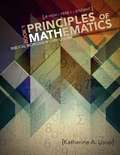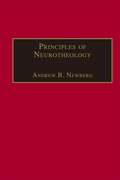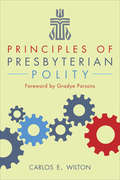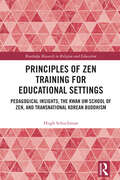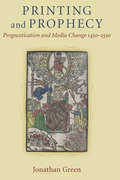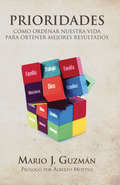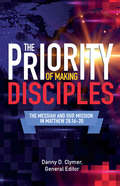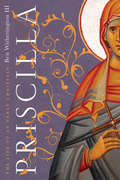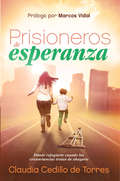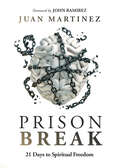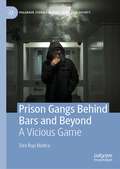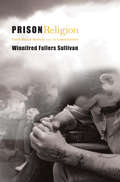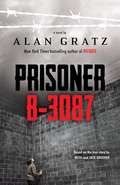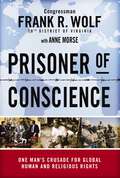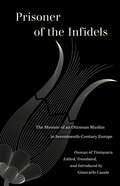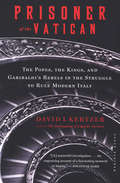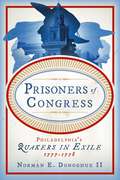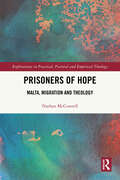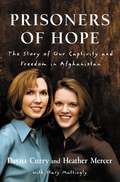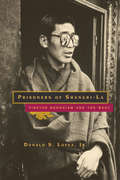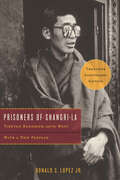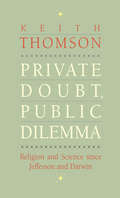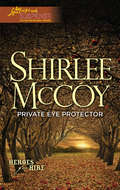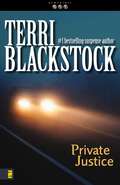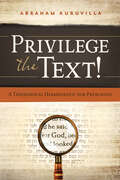- Table View
- List View
Principles of Mathematics: Book 1
by Katherine A. LoopThis is Year 1 of a two-year math course designed to give students a firm mathematical foundation, both academically and spiritually. Not only does the curriculum build mathematical thinking and problem-solving skills, it also shows students how a biblical worldview affects our approach to math's various concepts. Students learn to see math, not as an academic exercise, but as a way of exploring and describing consistencies God created and sustains. The worldview is not just an addition to the curriculum, but the starting point. Science, history, and real life are integrated throughout.
Principles of Neurotheology (Routledge Science and Religion Series)
by Andrew B. NewbergFirst Published in 2017. Neurotheology has garnered substantial attention in the academic and lay communities in recent years. Several books have been written addressing the relationship between the brain and religious experience and numerous scholarly articles have been published on the topic, some in the popular press. The scientific and religious communities have been very interested in obtaining more information regarding neurotheology, how to approach this topic, and how science and religion can be integrated in some manner that preserves both. If neurotheology is to be considered a viable field going forward, it requires a set of clear principles that can be generally agreed upon and supported by both the theological or religious perspective and the scientific one as well. Principles of Neurotheology sets out the necessary principles of neurotheology which can be used as a foundation for future neurotheological discourse. Laying the groundwork for a new synthesis of scientific and theological dialogue, this book proposes that neurotheology, a term fraught with potential problems, is a highly useful and important voice in the greater study of religious and theological ideas and their intersection with science.
Principles of Presbyterian Polity
by Carlos E. WiltonPastors, church leaders, and students of Presbyterian polity will find this a useful guide to Presbyterian Church (U.S.A.) governance based on foundational principles. Recent changes in the PC(USA) Constitution have meant fewer rules and more flexibility in governance, making it imperative that leaders understand the historical principles that guide the church. Wilton explains the Book of Order's historic principles of church order in accessible language, providing readers with a lively appreciation of the revolutionary principles that guided the Presbyterian experiment in the New World and are still the beating heart of church life today. Principles of Presbyterian Polity is written from the conviction that it is not enough merely to know the "what" of polity; a deep, intuitive understanding of the "why" is just as vital. Church leaders will come away with a greater understanding of the Book of Order and have confidence using it in practical situations.
Principles of Zen Training for Educational Settings: Pedagogical Insights, the Kwan Um School of Zen, and Transnational Korean Buddhism (Routledge Research in Religion and Education)
by Hugh SchuckmanThis book provides insights into new developments and persistent traditions in Zen teacher training and education through the use of historical archival research and original interviews with living Zen Masters. It argues that some contemporary Euro-American social values of gender equality, non-discrimination, rationality, ecumenicism and democracy permeate not only the organizational aspects of the Kwan Um School of Zen case study, but soteriological processes and goals of the training more widely. Each chapter showcases the ways important facets of Zen education—from meditation to curriculum development to school management — have absorbed Euro-American cultural and social ideals in both community and educational practices. Giving dedicated scholarly attention and conceptualising new adaptations in transnational Zen communities, it constitutes an important and timely addition to the literature and will appeal to researchers and scholars of religion and education, Asian pedagogies, contemporary Buddhism, transnational Zen, and Zen education.
Printing and Prophecy: Prognostication and Media Change, 1450-1550
by Jonathan GreenPrinting and Prophecy: Prognostication and Media Change 1450-1550examines prognostic traditions and late medieval prophetic texts in the first century of printing and their effect on the new medium of print. The many prophetic and prognostic works that followed Europe's earliest known printed book---not the Gutenberg Bible, but theSibyl's Prophecy, printed by Gutenberg two years earlier and known today only from a single page---over the next century were perennial best sellers for many printers, and they provide the modern observer with a unique way to study the history and inner workings of the print medium. The very popularity of these works, often published as affordable booklets, raised fears of social unrest. Printers therefore had to meet customer demand while at the same time channeling readers' reactions along approved paths. Authors were packaged---and packaged themselves---in word and image to respond to the tension, while leading figures of early modern culture such as Paracelsus, Martin Luther, and Sebastian Brant used printed prophecies for their own purposes in a rapidly changing society. Based on a wide reading of many sources,Printing and Prophecycontributes to the study of early modern literature, including how print changed the relationship among authors, readers, and texts. The prophetic and astrological texts the book examines document changes in early modern society that are particularly relevant to German studies and are key texts for understanding the development of science, religion, and popular culture in the early modern period. By combining the methods of cultural studies and book history, this volume brings a new perspective to the study of Gutenberg and later printers.
Prioridades: Cómo ordenar nuestra vida para obtener mejores resultados
by Mario J. GuzmánPrincipios que transforman su relación con Dios, vida familiar y ministerio Existen grandes soñadores que no han podido ver sus sueños realizados por el desequilibrio y la indiscipllina que hubo en sus vidas. Otros han logrado sus sueños, pero en el camino LA FAMILIA se ha debilitado y desintegrado. Muchos hijos de personas exitosas no han tenido un desarrollo saludable. Podemos alcanzar éxito, pero: ¿Quién se está llevando lo mejor de nosotros? Procuremos que nuestra familia o nuestra intimidad con Dios no sea el precio de nuestro éxito. Conozca la importancia de ordenar su vida y de establecer prioridades. El pastor Mario J. Guzmán presenta de una forma clara y práctica principios bíblicos que le ayudarán a: -Tener una relación madura con Dios - Tener un noviazgo bien enfocado - Tener un matrimonio e hijos saludables - Desarrollarse en el ministerio eficazmente - Elevar su área laboral a la excelencia - Ser de voluntad firme - Terminar las cosas que ha comenzado
Priority of Making Disciples, The: The Messiah and Our Mission in Matthew 28:16-20
by Danny ClymerThose in the church and ministry are familiar with the Great Commission – the call to go forth and make disciples. However, for many, it isn’t that easy in a world increasingly influenced by doubters and distractions. Many Christian leaders may talk about it, but few really do it. Making disciples isn’t a complicated program, but a simple plan that comes only from Jesus. Now a diverse group of pastors, representing urban and rural communities, secular and Christian areas, as well as diverse multicultural backgrounds, and all known for successfully making new disciples, have gathered these sermons to encourage others to be disciple makers too. Discover: How Jesus practiced the Great Commission before He ever preached it Why discipleship begins with a whole-life understanding of worship When disciple-making gets confused with church growth efforts These and countless other insights will help guide you in a faithful, deliberate effort to fulfill the Great Commission – no matter where you live or what communities in which you minister. Included in the book are: The sermon texts and their outline formats. 12 study guides, one for each sermon, that can be used in small group or one-on-one settings in the week following the preaching of the sermon. A final appendix providing a self-evaluation tool that helps each person being discipled to evaluate the progress they are making in their walk with Christ.
Priscilla: The Life of an Early Christian
by Ben Witherington IIIWho was Priscilla? Readers of the Bible may know her as the wife of Aquila, Paul's coworker, or someone who explained baptism to Apollos. Biblical references to Priscilla spark questions: Why is she mentioned before her husband? Does the mention of her instruction of Apollos mean that women taught in the church? What is her story? Ben Witherington addresses these questions and more. In this work of historical fiction, Priscilla looks back on her long life and remembers the ways she has participated in the early church. Her journey has taken her to Ephesus, Corinth, and Rome, and she's partnered with Paul and others along the way. Priscilla's story makes the first-century world come alive and helps readers connect the events and correspondence in different New Testament books. Witherington combines biblical scholarship and winsome storytelling to give readers a vivid picture of an important New Testament woman.
Prisioneros de esperanza: Dónde refugiarse cuando las circunstancias tratan de ahogarte
by Claudia P. CedilloNo hay amor como el de una madre... Pero cuando se encuentra frente a una cama de hospital batallando por la vida de su hijo, ese amor maternal aumenta y se fortalece. Es entonce scuando la fe es probada y la oracióm se convierte ene l arma más poderosa. En Prisioneros de esperanza Claudia Cedillo de Torres narra cómo experimentó al orar por sus tres hijos una respuesta diferente de parte de Dios para cada uno de ellos. Un "espera" para el hijo que nació con hemofilia, un "no" para el bebito que falleció y un "sí" para su hija que Dios sanó milagrosamente de un tumor en la cabeza. Además la autora comparte lo que aprendió de cada una de esas experiencias y cómo esto la ha equipado para ayudar a otras mujeres en situaciones similares. Perpárate para ser inspirado y animado mientras lees sobre el poder de la oración y los resultados que se obtienen cuando nos entregamos completamente a la voluntad de Dios.
Prison Break: 21 Days to Spiritual Freedom
by Juan MartinezA life with Christ is about unshackling your chains of bondage to embrace a life of freedom. After reading this book you will understand the value of experiencing physical and psychological freedom that can only be found in Christ. You will be encouraged to uncover the root issues of your past traumas so that you can find real healing and transformation for a fruitful life. After experiencing the realities of a physical prison cell, Pastor Juan Martinez has made it his mission to help others find freedom in every way possible—spiritually, culturally, emotionally, psychologically, and physically. Encouraging life change through practical steps—such as challenging negative thinking patterns with positive affirmations and setting realistic goals—this twenty-one-day devotional helps expose the internal anxiety, faulty thinking, and traumas that put readers behind figurative or literal bars, causing them to repeatedly make bad decisions and experience relationship challenges. Readers will recognize the root causes of the psychological chains breaking them so they can reach greater personal growth. Prison Break serves as a poignant reminder that freedom is possible and shows readers that with the right mindset, they can overcome past mistakes, forgive others, be renewed by the transformation of their minds, and lead a fulfilling life.Features and Benefits: Daily readings that encourage readers to seek healing and wholeness, reject old mindsets, and embrace new life in Christ Reflections on God's unconditional love and forgiveness Affirmations to help readers find strength and hope Prayer prompts to guide readers in seeking divine protection and direction Motivation to trust God's will and plans
Prison Gangs Behind Bars and Beyond: A Vicious Game (Palgrave Studies in Risk, Crime and Society)
by Dev Rup MaitraThis book draws on a four-year ethnographic study conducted in the prisons and on the streets of Greater Manchester, England, to examine gangs and organised crime in the North of England. It includes the personal testimonies of active prison gang members and major organised crime figures, many of whom are behind bars, and some active street gang members. It presents an holistic account by exploring the linkages that exist between prisons and the streets, including the lines of continuity between gangs on both sides of the prison walls and how gang affiliation straddles this divide. It offers data on the region’s drug market (specifically Class A drugs) as this market is the lynchpin of the underworld, both within and without prison. It also includes the perspectives and insights of prison officers, police detectives, youth workers, active and former street gang members and the parents of deceased gang members. This is a ground-breaking, contemporary study, analysing English gang compositions and activities, with its findings and results based on qualitative interviews and ethnographic research.
Prison Religion: Faith-Based Reform and the Constitution
by Winnifred Fallers SullivanMore than the citizens of most countries, Americans are either religious or in jail--or both. But what does it mean when imprisonment and evangelization actually go hand in hand, or at least appear to? What do "faith-based" prison programs mean for the constitutional separation of church and state, particularly when prisoners who participate get special privileges? In Prison Religion, law and religion scholar Winnifred Fallers Sullivan takes up these and other important questions through a close examination of a 2005 lawsuit challenging the constitutionality of a faith-based residential rehabilitation program in an Iowa state prison. Americans United for the Separation of Church and State v. Prison Fellowship Ministries, a trial in which Sullivan served as an expert witness, centered on the constitutionality of allowing religious organizations to operate programs in state-run facilities. Using the trial as a case study, Sullivan argues that separation of church and state is no longer possible. Religious authority has shifted from institutions to individuals, making it difficult to define religion, let alone disentangle it from the state. Prison Religion casts new light on church-state law, the debate over government-funded faith-based programs, and the predicament of prisoners who have precious little choice about what kind of rehabilitation they receive, if they are offered any at all.
Prisoner B-3087
by Alan Gratz<p>Survive. At any cost. 10 concentration camps. 10 different places where you are starved, tortured, and worked mercilessly. It's something no one could imagine surviving. But it is what Yanek Gruener has to face. <p>As a Jewish boy in 1930s Poland, Yanek is at the mercy of the Nazis who have taken over. Everything he has, and everyone he loves, have been snatched brutally from him. And then Yanek himself is taken prisoner -- his arm tattooed with the words PRISONER B-3087. <p>He is forced from one nightmarish concentration camp to another, as World War II rages all around him. He encounters evil he could have never imagined, but also sees surprising glimpses of hope amid the horror. He just barely escapes death, only to confront it again seconds later. <p>Can Yanek make it through the terror without losing his hope, his will -- and, most of all, his sense of who he really is inside? Based on an astonishing true story.</p>
Prisoner of Conscience: One Man's Crusade for Global Human and Religious Rights
by Anne Morse Frank WolfWhat’s a congressman from Virginia doing in places where bullets fly and babies starve? Thirty years ago, Frank Wolf was elected to the U.S. Congress to address local transportation issues. Fueled by a faith that made him believe he could do something about it, the congressman grew to champion human and religious rights around the world—from cracking down on gang-related crimes in the U.S. to relieving suffering from war, AIDS, and famine in places like Darfur, China, and Bosnia. Eventually, he became a key proponent of opposing radical Jihadists and creating a National Committee on Terrorism. As Wolf visited some of the most dangerous places in the world, he saw firsthand the need for members of Congress to speak out for persecuted people around the globe. In Prisoner of Conscience, he shares intimate stories of his adventures from the halls of political power to other dangerous places around the world, what he has learned along the way, and what you can do about it now.
Prisoner of the Infidels: The Memoir of an Ottoman Muslim in Seventeenth-Century Europe
by Osman of TimisoaraVictor Hugo meets Papillon in this effervescent memoir of war, slavery, and self-discovery, told with aplomb and humor in its first English translation. A pioneering work of Ottoman Turkish literature, Prisoner of the Infidels brings the seventeenth-century memoir of Osman Agha of Timişoara—slave, adventurer, and diplomat—into English for the first time. The sweeping story of Osman’s life begins upon his capture and subsequent enslavement during the Ottoman–Habsburg Wars. Adrift in a landscape far from his home and traded from one master to another, Osman tells a tale of indignation and betrayal but also of wonder and resilience, punctuated with queer trysts, back-alley knife fights, and elaborate ruses to regain his freedom. Throughout his adventures, Osman is forced to come to terms with his personhood and sense of belonging: What does it mean to be alone in a foreign realm and treated as subhuman chattel, yet surrounded by those who see him as an object of exotic desire or even genuine affection? Through his eyes, we are treated to an intimate view of seventeenth-century Europe from the singular perspective of an insider/outsider, who by the end his account can no longer reckon the boundary between Islam and Christendom, between the land of his capture and the land of his birth, or even between slavery and redemption.
Prisoner of the Vatican: The Popes, the Kings, and Garibaldi's Rebels in the Struggle to Rule Modern Italy
by David I. KertzerA Pulitzer Prize winner&’s &“fascinating&” account of the political battles that led to the end of the Papal States (Entertainment Weekly). From a National Book Award–nominated author, this absorbing history chronicles the birth of modern Italy and the clandestine politics behind the Vatican&’s last stand in the battle between the church and the newly created Italian state. When Italy&’s armies seized the Holy City and claimed it for the Italian capital, Pope Pius IX, outraged, retreated to the Vatican and declared himself a prisoner, calling on foreign powers to force the Italians out of Rome. The action set in motion decades of political intrigue that hinged on such fascinating characters as Garibaldi, King Viktor Emmanuel, Napoleon III, and Chancellor Bismarck. Drawing on a wealth of secret documents long buried in the Vatican archives, David I. Kertzer reveals a fascinating story of outrageous accusations, mutual denunciations, and secret dealings that will leave readers hard-pressed to ever think of Italy, or the Vatican, in the same way again. &“A rousing tale of clerical skullduggery and topsy-turvy politics, laced with plenty of cross-border intrigue.&” —Kirkus Reviews, starred review
Prisoners of Congress: Philadelphia’s Quakers in Exile, 1777–1778
by Norman E. Donoghue IIIn 1777, Congress labeled Quakers who would not take up arms in support of the War of Independence as “the most Dangerous Enemies America knows” and ordered Pennsylvania and Delaware to apprehend them. In response, Keystone State officials sent twenty men—seventeen of whom were Quakers—into exile, banishing them to Virginia, where they were held for a year.Prisoners of Congress reconstructs this moment in American history through the experiences of four families: the Drinkers, the Fishers, the Pembertons, and the Gilpins. Identifying them as the new nation’s first political prisoners, Norman E. Donoghue II relates how the Quakers, once the preeminent power in Pennsylvania and an integral constituency of the colonies and early republic, came to be reviled by patriots who saw refusal to fight the English as borderline sedition. Surprising, vital, and vividly told, this narrative of political and literal warfare waged by the United States against a pacifist religious group during the Revolutionary War era sheds new light on an essential aspect of American history. It will appeal to anyone interested in learning more about the nation’s founding.
Prisoners of Hope: Malta, Migration and Theology (Explorations in Practical, Pastoral and Empirical Theology)
by Nathan McConnellPrisoners of Hope focuses on ecclesiological and practical theological responses to migration, asylum-seeking, and refugee integration and assimilation. It considers the relationship between the church and the nation-state relative to political asylum by questioning the various responses of Christians who advocate for refugees and asylum-seekers in their spheres of influence. Prisoners of Hope features how the Church might begin to appraise and address the various socio-political strategies employed by nation-states, which situate migrants in a form of “quasi-political” status as they move from one place to another. It holds key benefits for exploring the philosophical and theological intersections of Dietrich Bonhoeffer, Giorgio Agamben, and Seyla Benhabib and those attempting to ask about treatment of the refugees and asylum-seekers. Prisoners of Hope will be of particular interest to those attempting scholarly research in the areas of theology, religion, and migration studies as it investigates the phenomenological experiences of refugees going “in” and “out” of detention as well as arguments relating to porous borders within sovereign national entities. Initially, the book engages definitions of migration, moving onto concepts of State of Exception and Homo Sacer, and analysing arguments regarding porous borders and cosmopolitanism. Of specific benefit for Christian theology is the second half of the book, which examines the importance of vicarious witnessing, prayer, voicing inclusion, worshipping communities, and the inclusion of the “other.” Overall, Prisoners of Hope is a pertinent addition to those discussing concepts of national sovereignty, migrant assimilation, asylum-seeking, hospitality, and the juxtapositioning of the foreigner within the often, intricate dialogues associated with political entry.
Prisoners of Hope: The Story of Our Captivity and Freedom in Afghanistan
by Stacy Mattingly Dayna Curry Heather MercerThe gripping and inspiring story of two extraordinary women--from their imprisonment by the Taliban to their rescue by U. S. Special Forces. When Dayna Curry and Heather Mercer arrived in Afghanistan, they had come to help bring a better life and a little hope to some of the poorest and most oppressed people in the world. Within a few months, their lives were thrown into chaos as they became pawns in historic international events. They were arrested by the ruling Taliban government for teaching about Christianity to the people with whom they worked. In the middle of their trial, the events of September 11, 2001, led to the international war on terrorism, with the Taliban a primary target. While many feared Curry and Mercer could not survive in the midst of war, Americans nonetheless prayed for their safe return, and in November their prayers were answered. InPrisoners of Hope, Dayna Curry and Heather Mercer tell the story of their work in Afghanistan, their love for the people they served, their arrest, trial, and imprisonment by the Taliban, and their rescue by U. S. Special Forces. The heart of the book will discuss how two middle-class American women decided to leave the comforts of home in exchange for the opportunity to serve the disadvantaged, and how their faith motivated them and sustained them through the events that followed. Their story is a magnificent narrative of ordinary women caught in extraordinary circumstances as a result of their commitment to serve the poorest and most oppressed women and children in the world. This book will be inspiring to those who seek a purpose greater than themselves. From the Hardcover edition.
Prisoners of Shangri-La: Tibetan Buddhism and the West
by Donald S. Lopez Jr.Prisoners of Shangri-La is a provocative analysis of the romance of Tibet, a romance that, even as it is invoked by Tibetan lamas living in exile, ultimately imprisons those who seek the goal of Tibetan independence from Chinese occupation. "Lopez lifts the veil on America's romantic vision of Tibet to reveal a country and a spiritual history more complex and less ideal than popular perceptions allow. . . . Lively and engaging, Lopez's book raises important questions about how Eastern religions are often co-opted, assimilated and misunderstood by Western culture."--Publishers Weekly "Proceeding with care and precision, Lopez reveals the extent to which scholars have behaved like intellectual colonialists. . . . Someone had to burst the bubble of pop Tibetology, and few could have done it as resoundingly as Lopez."--Booklist "Fascinating. . . [A] provocative exploration. Lopez conveys the full dizziness of the Western encounter with Tibet and Tibetan Buddhism."--Fred Pheil, Tricycle: The Buddhist Review "A timely and courageous exploration. . . . [Lopez's] book will sharpen the terms of the debate over what the Tibetans and their observers can or should be doing about the place and the idea of Tibet. And that alone is what will give us all back our Shambhala."--Jonathan Spence, Lingua Franca Book Review "Lopez's most important theme is that we should be wary of the idea . . . that Tibet has what the West lacks, that if we were only to look there we would find the answers to our problems. Lopez's book shows that, on the contrary, when the West has looked at Tibet, all that it has seen is a distorted reflection of itself."--Ben Jackson, Times Higher Education Supplement
Prisoners of Shangri-La: Tibetan Buddhism and the West
by Donald S. Lopez Jr.To the Western imagination, Tibet evokes exoticism, mysticism, and wonder: a fabled land removed from the grinding onslaught of modernity, spiritually endowed with all that the West has lost. Originally published in 1998, Prisoners of Shangri-La provided the first cultural history of the strange encounter between Tibetan Buddhism and the West. Donald Lopez reveals here fanciful misconceptions of Tibetan life and religion. He examines, among much else, the politics of the term “Lamaism,” a pejorative synonym for Tibetan Buddhism; the various theosophical, psychedelic, and New Age purposes served by the so-called Tibetan Book of the Dead; and the unexpected history of the most famous of all Tibetan mantras, om mani padme hum. More than pop-culture anomalies, these versions of Tibet are often embedded in scholarly sources, constituting an odd union of the popular and the academic, of fancy and fact. Upon its original publication, Prisoners of Shangri-La sent shockwaves through the field of Tibetan studies—hailed as a timely, provocative, and courageous critique. Twenty years hence, the situation in Tibet has only grown more troubled and complex—with the unrest of 2008, the demolition of the dwellings of thousands of monks and nuns at Larung Gar in 2016, and the scores of self-immolations committed by Tibetans to protest the Dalai Lama’s exile. In his new preface to this anniversary edition, Lopez returns to the metaphors of prison and paradise to illuminate the state of Tibetan Buddhism—both in exile and in Tibet—as monks and nuns still seek to find a way home. Prisoners of Shangri-La remains a timely and vital inquiry into Western fantasies of Tibet.
Private Doubt, Public Dilemma
by Keith Stewart ThomsonEach age has its own crisis--our modern experience of science-religion conflict is not so very different from that experienced by our forebears, Keith Thomson proposes in this thoughtful book. He considers the ideas and writings of Thomas Jefferson and Charles Darwin, two men who struggled mightily to reconcile their religion and their science, then looks to more recent times when scientific challenges to religion (evolutionary theory, for example) have given rise to powerful political responses from religious believers. Today as in the eighteenth century, there are pressing reasons for members on each side of the religion-science debates to find common ground, Thomson contends. No precedent exists for shaping a response to issues like cloning or stem cell research, unheard of fifty years ago, and thus the opportunity arises for all sides to cooperate in creating a new ethics for the common good.
Private Eye Protector
by Shirlee MccoyAfter an accident, single mother Rayne Sampson loses her recent memories. Thankfully, her sweet baby girl is front and center in her mind-but so is the terrifying image of a dangerous man. Someone with terrible intent is after her. Private investigator Chance Richardson assures her she's safe. But when her life-and baby-are threatened, the handsome former army chaplain vows to catch the stalker...all while keeping his heart guarded. Until a predator's ultimate betrayal changes everything forever.
Private Justice (Newpointe 911 #1)
by Terri BlackstockStaying together had seemed impossible. Now it’s their only hope. A dark shadow of fear has fallen over Newpointe, Louisiana. First one, then another of the town firemen’s wives has been murdered, and a third has barely escaped an attempt on her life. Incredible as it seems, a serial killer is stalking this sleepy little southern community. And Mark Branning’s wife may be next on the list. Mark is determined to protect her. But keeping Allie alive won’t be easy—not with their marriage already dying a bitter death. Unless they renew their commitment to each other and to God, someone else may settle their problems … permanently. And time to decide is running out. “This tense and exciting thriller is more than a fabulous read; it has an underlying message about the place of religion within a marriage. Highly recommended.”—Library Journal Private Justice is book one in the Newpointe 911 series by award-winning novelist Terri Blackstock. Newpointe 911 offers taut, superbly crafted novels of faith, fear, and close-knit small-town relationships, seasoned with romance and tempered by insights into the nature of relationships, redemption, and the human heart. Look also for Shadow of Doubt, Line of Duty, Word of Honor, and Trial by Fire.
Privilege the Text!: A Theological Hermeneutic for Preaching
by Abraham KuruvillaPrivilege the Text! spans the conceptual gap between biblical text and life application by providing a rigorous theological hermeneutic for preaching. Kuruvilla describes the theological entity that is the intermediary between ancient text and modern audience, and defines its crucial function in determining valid application. Based on this hermeneutic, he submits a new mode of reading Scripture for preaching: a Christiconic interpretation of the biblical text, a hermeneutically robust way to understand the depiction of the Second Person of the Trinity in Scripture.In addition, Kuruvilla&’s work provides a substantive theology of spiritual formation through preaching: what it means to obey God, the Christian&’s responsibility to undertake &“faith-full&” obedience to divine demand, and the incentives for such obedience—all integral to understanding the sermonic movement from text to application.Privilege the Text! promises to be useful not only for preachers, and students and teachers of homiletics, but for all who are interested in the exposition of Scripture that culminates in application for the glory of God.
